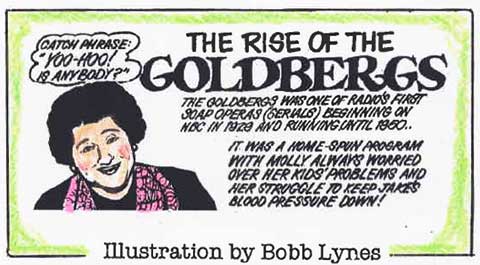|

This story was published in Radio Recall, the journal of the Metropolitan Washington Old-Time Radio Club, published six times per year.
Click here to return to the index of selected articles.
|
|
 RADIO AND THE JEWS: RADIO AND THE JEWS:
The Untold Story of How Radio Influenced America's Image of Jews, 1920s-1950s
By David S. and Susan Siegel
283 pages, trade paperback
$24.95 (Book Hunter Press)
Reviewed by Ron Barnett
(From Radio Recall, December 2007)
Long time OTR enthusiasts, David & Susan Siegel have compiled an exhaustive and thoroughly absorbing study chronicling the role Jews played in the development of early radio and the subsequent way radio portrayed Jews when pre W.W.II anti-Semitism was at its peak.
The scope of the book is wide-ranging: the beginnings of NBC and CBS both headed by two highly influential Jews, David Sarnoff and William Paley, are described in detail. The book notes that almost from radio’s inception, Jewish programs and sketches were often heard with The Rise of the Goldbergs (later to become simply, The Goldbergs) among the most popular programs during most of the 30’s. Later in the book, a chapter is devoted to another popular Jewish themed program, Abie’s Irish Rose.
While there are a few programs available from these two series referenced above, the Siegel’s research has identified some rare and largely forgotten series which unfortunately, have few if any, recordings known to exist. These include, Meyer the Buyer, The Jewish Poker Game, Mama Bloom’s Brood, The House of Glass, and Cohen, the Detective. Sadly, few programs aired in the late 20’s and early 30’s were recorded and therefore were lost forever.

The authors note that early on, sketches and programs regularly featured Yiddish (Jewish) dialect, Jewish names and often self-depreciating humor. By the late 30’s, this eventually changed as second generation Jews assimilated in our nation’s “melting pot” and most Jewish programming no longer used Yiddish accents and stereotypical mannerisms.
Today, few can recall the extent of anti-Semitism prevalent during the 30’s and 40’s when the country was in the throes of the great depression, watched the rise of Nazi persecution of the Jews and subsequently was drawn into W.W.II. Jews presented a convenient scapegoat for the nation’s ills and remarks and speeches by luminaries such as Charles Lindbergh and Henry Ford were considered by many to be anti-Semitic.
One of the chapters describes how wide spread this problem was and how anti-Semitism found a prominent voice on radio by Father Charles E. Coughlin also known as the “Radio Priest.” There is a fascinating recounting of his oratory skills and his understanding of mass psychology both of which were used to fan his anti-Semitic messages to millions of listeners throughout the nation.
Another chapter addresses religious programming broadcast on large and small radio stations both locally and nationally. Although a number of programs are mentioned by the authors, the multi-award winning series, The Eternal Light is especially detailed, noting that it was one of the most popular and influential religious series during the mid 40’s to the mid 50’s.
A 60+ minute CD produced by Jerry Haendiges, is included with the book and has excerpts from many shows featuring Jewish themed sketches and programs. Listeners will likely wish that excerpts of two notable long-running series, The Eternal Light and Father Coughlin were of longer duration than 60 seconds and covered more than the program’s opening themes.
Radio and the Jews is scholarly, informative and enlightening. To underscore the many sources that were used in researching this book, following every chapter, a multipage listing of resource notes are included. Readers will surely gain a much greater understanding of the role Jews played during radio’s formative years and how radio programming sought to portray their contributions to American society. To paraphrase an old slogan of bread and bagel producers, “you don't have to be Jewish, to enjoy David and Susan Siegel’s Radio and the Jews."
The book can be ordered directly on line at: www.bookhunterpress.com or by contacting Book Hunter Press by phone: (914) 245-6608, fax: (914) 245-2630 or regular mail addressed to publisher: Book Hunter Press, PO Box 193, Yorktown Heights, NY 10598
|